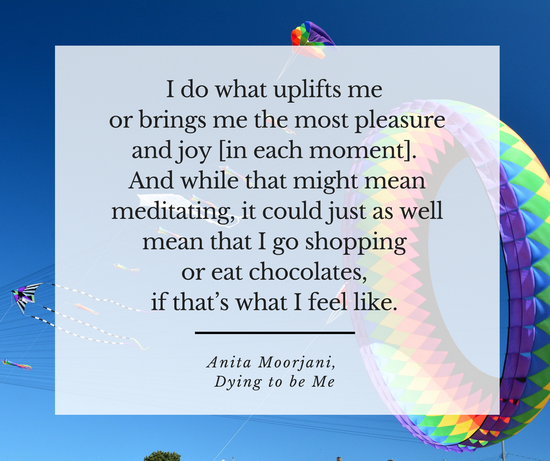
Uma Sanghvi helps people release fear & anxiety, connect with their Higher Self wisdom and live a radiant life of rest and joy.
Consider this idea: your body is wiser than your mind.
Intuition is expressed through your body. By honoring the desires of your body, you’re listening to your intuition and honoring your higher wisdom.
If something feels good to your body, then it IS good.
Why is the idea that if something feels good, it is good for us, so radical? Why do we put a crushing amount of pressure on ourselves to do things that don’t feel good to our body? Because we live in an overly cognitive time in human history. Because intellect is prized highly. Because we don’t even remember, as a species, how to truly connect to our bodies and our intuition.
Because we’re surrounded by messaging that our bodies are weak and animalistic and need to be subjugated and controlled. We force our bodies to bend to the will of our mind.
We congratulate ourselves for eating food we don’t like. We exercise when exhausted. We brag about not using up our vacation days. We wear busyness, over-work and sleep deprivation like a badge of honor.
We resist rest, delight and play.
We shame our pleasures (this is especially true for women).
When was the last time someone gave you this advice?
If you want chocolate, eat chocolate.
If you’re sleep deprived, just in sleep in today and forget about the gym.
Joy is job #1
Do what feels good.
Has anyone EVER given you that kind of advice?
WHAT IF: feeling good is actually a good thing? Good for the soul….
Good for our health.
Good for our bank account.
Good for our relationships.
Good for our career.
Good for our longevity.
What if we’ve got this whole deprivation thing backwards?

The origins of guilt
As children, we’re taught to stifle our impulses. We’re reprimanded when we run in the house, when we burp, when we’re too exuberant/angry/sad/loud. And so from an early age, we start to suppress our authentic self and create a more socially-acceptable version.
“Growing up” becomes synonymous with suppressing our body and it’s impulses.
Our parents and teachers acted out of concern for us. But as a result, by the time we’re adults our expressions of joy get buried deep under layers of suppression.
Another source of suppression is religion. Many religious teachings (although not all) encourage the bypassing of desire. For Americans, I believe that our Puritanical origins can get in the way of enjoying life.
How do I even know what feels good?
Sometimes, we get so caught up with what we’re supposed to do, that we don’t remember what it is we deeply want.
1. Tune into your body.
It knows what you truly desire. Is it rest? Is it exercise? Connection? Intimacy? Play? Adventure? Creativity? Music? Strength? Silence?
2. Be present in this moment.
Often, presence means slowing down.
When you slow down and check in with your body, you may find that what felt good yesterday may not feel good today. For example: your run yesterday might have felt great. But it’s possible that today what would feel best is yoga. Or a hike.
If you stay present while eating, you’ll be able to tell the moment that your body no longer wants more of whatever it is you’re eating (this is even true for your favorite food!) The first three bites may be heavenly. But a couple bites later, your body is saying I’m done. If you’ve dissociated from your body, you won’t hear that message. But if you’re present enough to be tuned into your body and it’s messages, you will hear I’m doneand hearing that message makes it easier to stop.
3. Learn to trust your body.
Notice how much easier, healthier and happier life gets when you learn to trust your body. The process of trusting your body (and dis-identifying with your mind) takes time. Be patient with yourself.
Too much of a good thing?
When it comes to the practice of feeling good, there’s a common fear that arises: what if I go overboard?
What about over-drinking, over-eating, retail therapy and the other addictions that afflict humans?
What if I spiral out of control?
Great question.
To actually know what feels good, you must be embodied.
When you’re embodied, you can feel and sense your own life force energy. You’re in direct contact with who you are and you know what you like.
Much of the time, we’re dissociated from the body and stuck in our thoughts in our head. When you’re “in your head” you’re not able to receive your bodies messages about what feels good.
In fact, we engage in addictive behaviors precisely for the purposes of dissociating from our body and numbing out.
When we’re engaging in addictive behaviors (which is a lot of the time), we are NOT embodied. We do drugs, binge on Netflix, drink too much, eat a lot of sugar and even over-work in order to escape from our body. Emotions like anger, sadness and fear live in our body. Addictions dissociate us from the body and serve as a bypass or an escape from the emotional discomfort that comes with being human.
Addictive behaviors are not so much about feeling good, as they are about running away from what feels bad.
The bottom line is this: it’s safe for you to do what feels good.
Furthermore, when you’re actively doing things that feel really good to your body – you’ll find your addictive behaviors start to dissolve. When you’re regularly cultivating feelings of goodness, you won’t need to bypass your emotions and your body as often.
Joy is your birthright
It’s time to reclaim your joy.
To be child-like, spontaneous, playful, silly and even yes, un-productive.
To run naked through the house, if that would be fun!
What would it feel like to jump in a puddle? Eat breakfast for dinner? Dance to your favorite song? Walk barefoot in the grass? Cannonball into the pool? Slurp your spaghetti? Bear hug someone for no particular reason?
Do something today just for the sake of joy.
Listen to your body.
If it feels good, it is good.
* * * * *
👉 Do you struggle with anxiety, stress and overwhelm? I can help.
👉 Click here to schedule a free discovery call with me.
* * * * *





